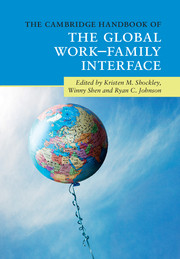Book contents
- The Cambridge Handbook of the Global Work–Family Interface
- The Cambridge Handbook of the Global Work–Family Interface
- Copyright page
- Contents
- Figures
- Tables
- Contributors
- Part I Overview
- 1 Introduction
- 2 A Comprehensive Review and Synthesis of the Cross-Cultural Work–Family Literature
- 3 GLOBE’s Cultural Dimensions: Implications for Global Work–Family Research
- Part II Assessing Cultural and Structural Differences
- Part III Methodological Considerations
- Part IV Review of Research in Regions across the Globe
- Part V Cultures within Cultures
- Part VI Organizational Perspectives
- Part VII Family Perspectives
- Part VIII Individual Perspectives
- Part IX Conclusion
- Index
- References
3 - GLOBE’s Cultural Dimensions: Implications for Global Work–Family Research
from Part I - Overview
Published online by Cambridge University Press: 16 April 2018
- The Cambridge Handbook of the Global Work–Family Interface
- The Cambridge Handbook of the Global Work–Family Interface
- Copyright page
- Contents
- Figures
- Tables
- Contributors
- Part I Overview
- 1 Introduction
- 2 A Comprehensive Review and Synthesis of the Cross-Cultural Work–Family Literature
- 3 GLOBE’s Cultural Dimensions: Implications for Global Work–Family Research
- Part II Assessing Cultural and Structural Differences
- Part III Methodological Considerations
- Part IV Review of Research in Regions across the Globe
- Part V Cultures within Cultures
- Part VI Organizational Perspectives
- Part VII Family Perspectives
- Part VIII Individual Perspectives
- Part IX Conclusion
- Index
- References
Summary
- Type
- Chapter
- Information
- Publisher: Cambridge University PressPrint publication year: 2018
References
- 2
- Cited by



